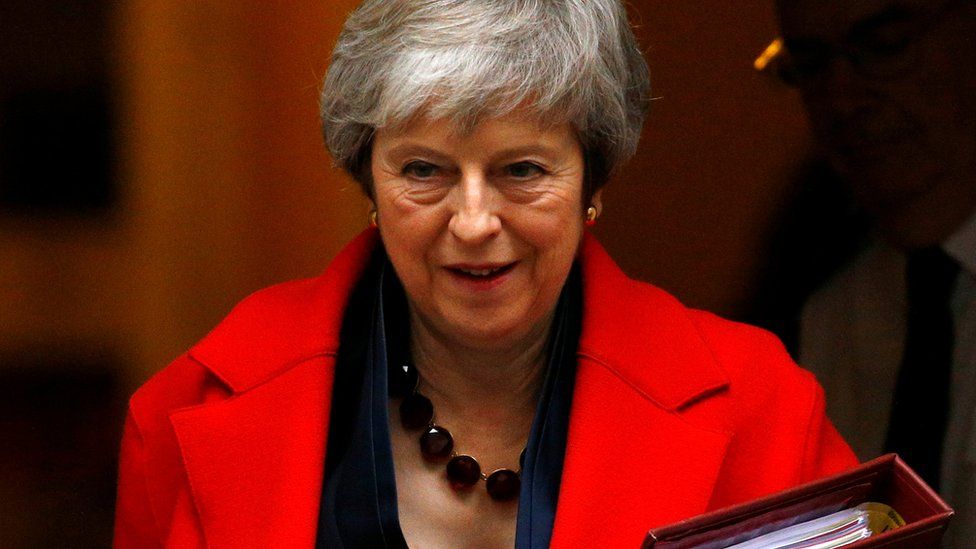Brexit debate: Clash over whether BBC or ITV will host debate
- Published
- comments

Prime Minister Theresa May has accepted the BBC's offer to take part in a debate on Brexit on Sunday 9 December, two days before MPs vote on her deal.
But Labour sources say the party has not yet agreed to take part, with Jeremy Corbyn telling This Morning he preferred ITV's offer.
The BBC said it was "delighted" Mrs May had accepted the offer.
It added it would discuss debate formats with both parties and would announce further details soon.
Mr Corbyn claimed he preferred ITV's bid out of "respect" for viewers who wanted to watch the I'm A Celebrity... Get Me Out Of Here! final on ITV the same evening - 9 December.
"I want to watch it myself," he said.
When approached by the BBC, ITV confirmed the final of the show would air at 21:00 GMT.
It is understood the BBC debate programme would start at 20:00 in Birmingham, after Strictly Come Dancing and replacing David Attenborough's Dynasties on BBC One.
BBC assistant political editor Norman Smith said Mrs May had accepted this offer "because there was a view on the government's side that the BBC would address the crux of the issue, namely the deal".
Jeremy Corbyn tells the This Morning programme he prefers ITV's Brexit debate proposal
Analysis
By BBC political correspondent Chris Mason
Recent history tells us TV debates involving politicians are long in the gestation, and painful in labour.
Welcome to 2018's anticipated arrival.
The BBC announces Theresa May has agreed to a debate - but there is a snag. Jeremy Corbyn hasn't said he will turn up. He would rather go on ITV.
And so starts the posturing among the telly luvvies along the lines of "my audience is bigger than yours".
There are other awkward questions for the broadcasters too: where is the passionate Brexiteer voice? Where is the advocate of another referendum?
Because even if Mr Corbyn accepts, the two biggest names on the programme wouldn't be a million miles apart on the fundamentals.
It would be a discussion between two people who voted Remain and are committed to delivering Brexit, talking to an audience that doesn't have a say on what happens next.
Oh and one last thought: this TV show, involving both of them, still might not happen.
Allow Twitter content?
This article contains content provided by Twitter. We ask for your permission before anything is loaded, as they may be using cookies and other technologies. You may want to read Twitter’s cookie policy, external and privacy policy, external before accepting. To view this content choose ‘accept and continue’.
Mrs May previously rejected calls for smaller political parties to take part in the debate, saying she and Mr Corbyn represented almost 90% of MPs in the Commons between them.
However, it is understood the BBC's proposed debate format would include a range of parties and opinions. The SNP, Lib Dems, Plaid Cymru and Greens have demanded to be involved.
Green MP Caroline Lucas tweeted that the debate should include dialogue "about all possible routes forward" - including another referendum.
Lib Dem leader Sir Vince Cable - who has also campaigned for another referendum - said he was "raring and willing to go" in the TV debate, adding it would be a "travesty" if only Mrs May and Mr Corbyn were involved.
Plaid Cymru leader Adam Price said his party had been "sidelined throughout the Brexit process" and their omission from any debate would perpetuate that problem.
Further referendum campaign People's Vote, meanwhile, said it had written to both the BBC and broadcasting regulator Ofcom regarding the proposed format of the debate.
The group said that, while other views may be represented as part of a panel, it "would not be acceptable to us if they were relegated to a sideshow away from the main debate between Mrs May and Mr Corbyn".
Ahead of the 2017 general election, Mrs May refused to take part in televised debates, with then home secretary Amber Rudd standing in for her on the BBC's programme.
The prime minister is beginning a two-week campaign to sell her Brexit deal to the public and MPs, before the vote in the House of Commons on 11 December.
- Published28 November 2018
- Published29 November 2018
- Published5 December 2018
- Published27 November 2018